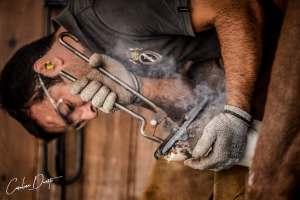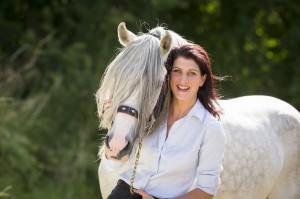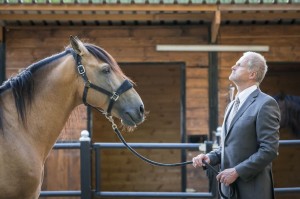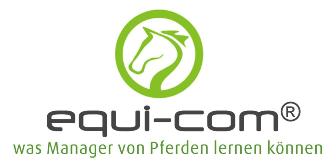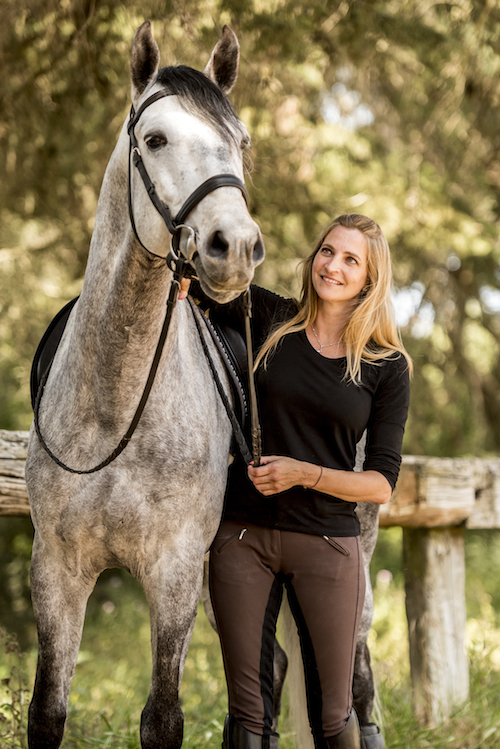Portugal´s 1st European Certified EuroFarrier
Image – Nuno Bernardes
First Farrier in Portugal with the European Certified EuroFarrier Qualification
This qualificated is issued by the European Federation of Farriers Association.
There is an old saying among horsemen, “No foot, No horse.” Despite their size and strength, horses are notoriously fragile animals. Four slender legs and small hooves must bear the horse’s full weight of 400 to 650 kilos.
Therefore hoof care is a vitally important issue for all horse owners. It is true that a horse may be able to sustain injury or illness in many parts of its body, the hoof bears weight and so adds hundreds of kilos of stress to any ailment. Maintaining a healthy hoof is the best way to give your horses a good chance to have a long, healthy lives. And that is only possible by having the best, and better educated, professionals at your service.
Developing a Passion for Hoof Care
After many years as an Equine Veterinarian, Nuno Bernardes found one area of equine medicine that shortly became his passion and his medical focus: Podiatry. One of the gaps he also found in his education was precisely hoof care and hoof therapeutics. And not only he decided to put his focus on improving his theoretical background on hoof and its conditions, but he also found the need to put his hands directly at the trade. Not having a true education reference in any institution in Portugal, he decided to engage in an Emergency Farrier Course in Spain that allowed him to get the basic skills to add to his already strong theoretical knowledge.

Following the premise that more qualification comes through education, in February this year Nuno Bernardes achieved a mile stone for Portuguese farriers by receiving the EFFA -Certified Eurofarrier Qualification. He has become the first farrier in Portugal to achieve this level of expertise. This certification recognizes the knowledge and skills to be able to perform legally the farrier trade in almost every country in Europe. Judge by recognized specialists through a very demanding and detailed examination, Nuno was able to pass this exam and get his recognition.
EFFA
EFFA -The European Federation of Farriers Associations develops a common basic standard of competence in farriery. The Mission of the European Federation of Farriers Associations is to improve the welfare of the horse by encouraging the highest standards of trimming and shoeing.
Nuno has been our farrier for a number of years and I have always been struck by how much knowledge and active interest he has in the subject . He is continuously committed to advancing his learning by regularly travelling to other countries for clinics and courses. With Nuno we have the added advantage that he is also a practising vet so he brings his veterinary knowledge to his work. His efforts have paid off and I think this will encourage many more farriers aim for the same level of excellence.
Sharing Knowledge to Bring the Standards in Portugal
Being very found of sharing his knowledge with veterinary students that he tutors, and other farriers, he is always available to lecture at the universities and in farrier meetings. One of his goals his to increase the level of the farrier trade in Portugal through a formal education program for starting farriers but also organizing Continuous Professional Development courses for already stablished farriers. Following this objective, Nuno also had a very important role in promoting the constitution of the Portuguese Farriers Association, from which he is also a board member.
The Art of a Good Farrier
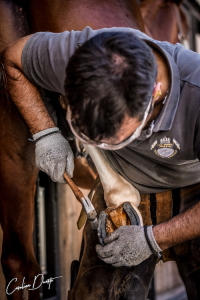
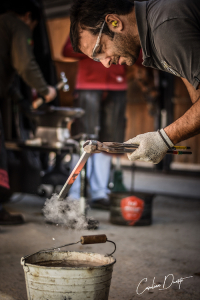 Thoroughout his daily work he deals with a lot of therapeutical cases, working in strong connection with some veterinarians and hospitals, but he also shoes horses that don’t have any particular problem but that do have owners that demand for a very knowledgeable professional.
Thoroughout his daily work he deals with a lot of therapeutical cases, working in strong connection with some veterinarians and hospitals, but he also shoes horses that don’t have any particular problem but that do have owners that demand for a very knowledgeable professional.
Our Experience with Nuno´s Work
Having owned horse most my life and now been in Portugal many years owning and selling horses I have seen the results of a huge amount of pre purchase examinations. I think it gives me small position to comment on the importance of good hoof care. I can honestly say that I have witnessed an improvement in the quality of farrier work but it has saddened many times when a lovely horse has been failed due to neglect in this area. I cannot stress enough how important it is to be rigorous when you own horses about hoof care and shoeing.
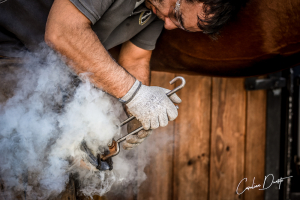
So how do we maintain a healthy hoof?
Just like our own health it is better to commit to overall wellbeing as a health benchmark. Not waiting for problems to take action. If the diet is right, the hooves are regularly checked even for breeding stock and good shoeing you are well on the way. Horses in work should have their hooves picked out daily before and after work. The aim of picking out the hooves is to keep out rocks, clean out damp bedding and mud to avoid thrush. Just like our fingernails, horse’s hooves grow continuously and need to be trimmed every five to six weeks to keep them in proper shape.
A Trained Farrier should do the Trimming.
Inexperienced horse owners can easily trim the hoof unproperly, leading to infection or discomfort. The hooves must also be balanced to the horse’s natural way this is done by seeing the horse moving and the wear of the shoe and hoof. If this is not done correctly the horse can end up uneven in their gait or worse physically disabled. Not every horse will require shoeing, but if your horses are doing a lot of hard work or working on hard surfaces, they will probably need to be shod. And if he is unbalanced or in need of therapeutic shoeing it will most certainly do.

Dangers of Not Maining Good Hoof Care Practise
There are a number of other problems that can occur If a hoof is not maintained well, problems such as thrush, canker, bruised sole, abscesses, and cracks in the hoof wall. Thrush is a sign of infection. You will recognise this by the malodourous discharge from the frog of the horse. To avoid this keep your horse out of constant wet, and dirty conditions. Bruised soles often occur after a poor shoeing job or if shoes are left on too long. Abscesses can be a horse’s nightmare. If an abscess develops, more than likely your horse will suddenly be impaired on one foot. They are caused by puncture wounds, or by bruising, but long and neglected hooves suffer the most. To solve this, you will need to see a veterinarian, have the abscess drained, poultice and assure that he has his tetanus vaccination updated. Cracks are important to avoid because they can also lead to infection and severe lameness. The easiest way to avoid cracks is to have a professional trim the hoof. Usually cracks develop from unbalanced hooves and wrong weight bearing distribution. Those pressures can affect the coronary band, where the hoof grows from, leading to the deep cracks that are quite hard and time consuming to manage.
Other conditions to be aware of are
There are other conditions too such as white line disease. The white line is the area (that looks whitish but more often is yellow) between the outside hoof wall and where it meets the sole. When this becomes damaged, it allows fungus and/or bacteria to invade and separate the layers of the hoof wall. If this happens, the infection can spread around the hoof and up the inside of the wall to gradually “eat away” at the hoof. It usually don’t cause lameness but its progression can go as high as the coronary band. At this stage it can compromise severely the suspension of the third phalanx within the hoof, leading to severe signs pretty similar to those of a laminitis.
A quality balanced diet is paramount for healthy hooves.
A quality balanced diet is paramount for healthy hooves. Horses that are obese or severely malnourished will eventually develop problems in the hooves. Horses’ hooves are made up of protein and keratin (the same stuff that makes up hair). Like a horse’s hair coat, hooves will grow faster when days are longer. And while hooves may be slower than your horse’s hair coat to tell you that your horse’s overall health is suffering, sooner or later you’ll see poor nutrition reflected in cracks, chips or uneven hoof growth. It may be a subtle (and slow-moving) nutrition report, but your horse’s hooves are doing their best to say “pay attention!” And never forget water!!!
Check the articles on feeding Lusitanos – knowing their history and early lifestyle helps hugely in understanding the right diet for them.
The Risks
An obese horse may be at risk for laminitis due to a metabolic condition known as Equine Metabolic Syndrome. Laminitis occurs when the delicate folds of tissue in the hoof (laminae) that produce the hard substance of the hoof wall and keep the hoof wall attached to the underlying bone, become inflamed or damaged. Left unattended, laminitis can lead to founder,a chronic condition in which a horse’s coffin bone rotates or sinks. Learn to be aware of the nutritional aspects of the feeds you choose especially the levels of sugar which is not suitable for horses in large amounts. In our management we prefer to keep sugar entirely out of our horses´ diet.
The benefits of plenty of movement is vital and when possible horses are better in overall well being when they can live some of their time outside in paddocks. Movement stimulates the blood flow to the hoof keeping them flexible and energised.
These are just tips about horse care and a few problems that could occur if you do not understand the importance of a healthy hoof. Just remember the old saying –
`No foot, no horse.’ A horse is only as strong as the feet it stands on.
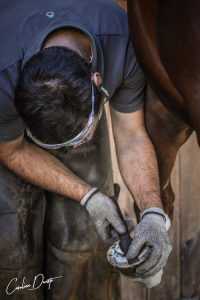 A big thank you to Nuno for his outstanding work and well deserved achievements it is another step for Portuguese Equestrian Culture and providing high quality service.
A big thank you to Nuno for his outstanding work and well deserved achievements it is another step for Portuguese Equestrian Culture and providing high quality service.
Text – Teresa Burton
Images Carolina Duarte Photography
You can contact Nuno Bernardes email nbluso@cvetequinos.com

